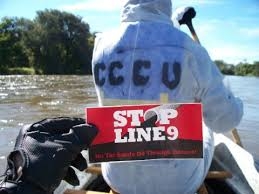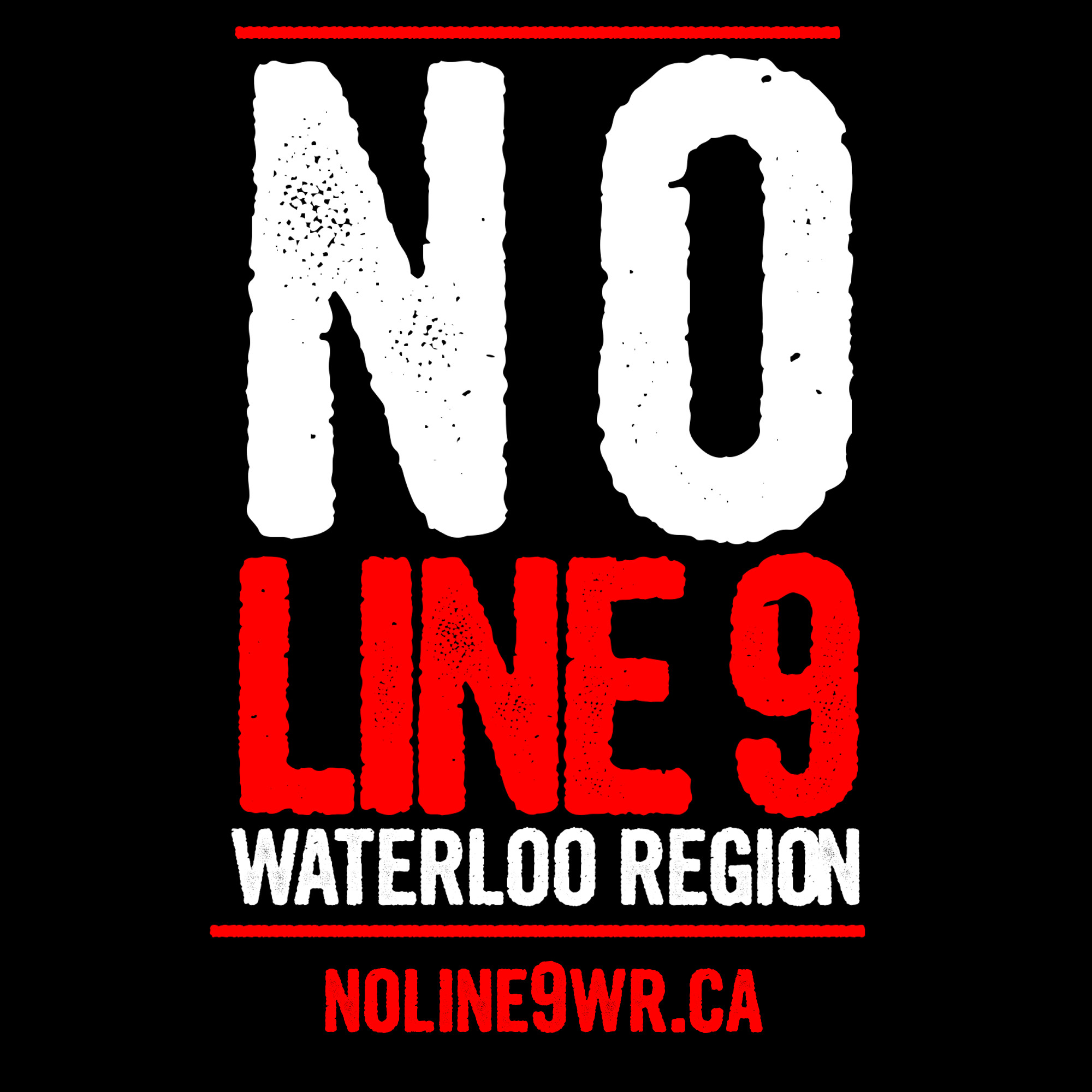Submitted by noline9 on

On September 27th 2023, the Waterloo Region Coalition Against Line 9 Presented at the monthly general meeting of the Grand River Conservation Authority, urging the council to release a statement of concern on dangers of the Line 9 pipeline. Settler responsibilities to the Haundenosaunee was also stressed in the 10 Minute Presentation.
While some council members were obviously interested in the topic, the GRCA took no action to address the specific threats to the Grand River watershed posed by the pipeline.
Listen here: http://grandrivermc.ca/grrr/noLine9-2013-09-27-GRCApresentation.mp3
Full Text of Speech:
Good morning, my name is dan kellar,
Acknowledgement (1:00)
I will begin today by acknowledging that we are on the Haldimand Tract, the Grand River Territory of the Haudenosaunee of the Six Nations. We say this to bring attention to our responsibilities as settlers on this land; responsibilities to the Onkwehon:we people, and to the treaties and agreements our governments and crowns have made with them.
The Grand River Conservation Authority proclaims to protect this river, a river that flows through through the Heart of the Six Nations reserve and the centre of the Haldimand Tract, the treaty land of the Haudenosaunee. As settlers here, we must recognize that Haudenosaunee peoples be intimately involved in all projects, plan, and programs, on this land that may impact them, and that a process seeking their free, prior, and informed consent is undertaken when we propose such projects.
Personal Statement (0:30)
i am a member of Grand River Indigenous Solidarity, a member group of the Waterloo Region Coalition Against Line 9. I was born in the Grand River watershed and have spent much of my life here. My partner and I are raising our family here, and with that comes specific responsibilities. I understand the protection of the water and the defense of the land as not only essential in creating healthy communities, but also paramount in upholding the treaties that have allowed this settler society to establish itself here.
I was trained locally in the field of geography and hold a masters degree on the practice of environmental impact assessment.
Intro to declaration (1:45)
The reason for our delegation this morning is to present a declaration issued by the Waterloo Region Coalition Against Line 9 – a growing network of over 25 signatory groups including social justice, environmental, and anti-poverty groups as well as local businesses and artists. This declaration, which we are urging you, as the Grand River Conservation Authority, to sign, highlights our primary points of concern regarding Enbridge’s proposed line 9 pipeline reversal project.
The project seeks to reverse the flow of this aging pipeline and ship diluted tar sands crude bitumen across southern Ontario and Quebec where it would eventually be shipped to oversea markets.
While the proposal to reverse the flow of the project through our region has been approved by the National Energy Board, shipping tar sands in the line has not, and at the upcoming NEB hearings in Toronto, we want to present the strongest case as to the concern over this project in the region.
We would like to emphasize the severity of the potential impacts of Enbridge's plan on Waterloo Region. Our declaration foregrounds five areas of concern and we will introduce those 5 areas now.
1.The transport of bitumen through this pipeline poses a terrible risk to the Grand River and the surrounding watershed - and this point was made all the more clear when earlier this week Enbridge simulated the death of the Grand River, with an exercise forecasting the Line 9’s forecasted failure.
2. Reversing Line 9 will provide no benefits to the Waterloo Region or local residents.
3. The reversal of the pipeline violates current treaties with Indigenous communities, both within the Haldimand Tract and elsewhere along the route.
4. Bitumen is more difficult and expensive to clean up than conventional crude.
5. The reversal will further entrench our region in the carbon economy, which contributes to climate change.
Expand on local risks (3:30)
The Line 9 pipeline crosses through our region, across farmland and forest, and waterways including the Grand River and the Nith River. When a spill does occur in the region and especially in one of these rivers, our region would be devastated by the environmental and economic impacts. As point 4 of our declaration states, bitumen behaves differently than conventional crude. First, it is substantially thicker; thus, it must be mixed with a chemical slurry and pumped at a much higher pressure for it to flow, putting the pipeline under greater stress. If spilled, bitumen sinks, and conventional clean-up measures simply do not work.
The 2010 spill in Kalamazoo, MI has still not been cleaned up; after over a billion dollars already spent, the river is now being dredged. And when the pipeline ruptures and the bitumen sinks, the chemicals added to the mix vaporise and create a toxic cloud, the health impacts of which were seen recently in Mayflower, AR as numerous local residents were sickened. Both of these pipelines were retrofitted to pump diluted bitumen, with pressure, temperature, and capacity increased, as is proposed for Line 9.
Additionally, fracked oil from the Bakken shale fields, the same volatile oil implicated in the destruction of the picturesque town Lac Megantic , is slated to be shipped in line 9 as well. Fracking is also implicated in groundwater toxification and irradiation, earthquakes, and landslide occurrences.
Further, the obvious damage to watersheds at the point source of the products to be shipped in this line is unjustifiable. The GRCA is responsible for the entirety of the watershed, yet the NEB will not allow discussion on the upstream or downstream impacts of the pipeline project. We cannot leave such an important decision to a body that is excluding essential aspects of the project’s impacts. The GRCA, with its wider outlook and understanding of ecological systems, can and should take a stand against this project that would severely threaten not only this watershed but all life surrounding the pipeline and the tar sands themselves.
If we need any more proof of this industries inability to safely control the “development” or regulation of the tarsands developments, we can consider the disaster that has been unfolding over the past 8 weeks in the Cold Lake area of Alberta. Here, an insitu tar sands project has literally broken the ground, forcing a toxic slurry to surface over a vast area of wilderness. The company responsible admits it does not know how to control the mess, and has been ordered to drain and dredge one of the affected lakes. Insitu developments are no longer subject to environmental impact assessments after recent changes to federal law.
With more than 800 significant spills in the past decade, which occurred despite industry standards and over a billion dollars spent on safety measures, it is clear that we cannot trust Enbridge’s persistent promises of safety. Their pipelines spill, including the recent failure of Line 37 north of Calgary, which enbridge blamed on “too much rain”. It is clear that it’s not a matter of if, but when, the pipeline will spill; line 9 has already spilled a dozen times. With these realities in mind, we can clearly see that the line 9 reversal would be disastrous to the region and its residents.
A local failure of Line 9 would compromise farms and other business operations along the line, and risk our drinking water – both in the many groundwater wells that dot the landscape and in the grand river. A spill on the line would also implicate our emergency responders. Enbridge relies on local municipalities to clean up their leaks and spills, and has recently failed to compensate affected parties, notably including two tribal councils, for their costs.
Enbridge trained the responders in Michigan prior to the Line 6 rupture, but 60 km of that river were still devastated. Exercises like the one performed this past Wednesday in Cambridge and Brantford will not serve to protect the river; as long as bitumen is allowed to flow through the pipelines that cross it, the river’s safety is compromised.
All these dire costs are not even accompanied by jobs for the region. Enbridge has promised 200 jobs over the scope of the reversal project, but these are spread across the entire line and would be clustered at the existing Enbridge terminals, none of which are in the region. Negative impacts to farms, small towns, and the river tourist industry would be significant in the event of the forecasted pipeline failure.
Indig Issues (2:00)
As I mentioned in our introduction, we are residing on Six Nations’ land in the Haldimand Tract. Notification is not consultation and under current agreements and treaties, any projects undertaken on this land must be done in consultation and with the free, prior, and informed consent of Six Nations. We understand that such consultation was not adequately sought, nor has such consent been given.
While ultimately the Crown holds this responsibility, they have consistently failed to act in this regard. In the absence of federal action, we feel it is incumbent upon local levels of Canadian government to cultivate relationships that honour the treaties held between the Crown and Indigenous nations.
Action from the GRCA against the approval of the Line 9 reversal project would begin to fulfil some aspects of our treaty responsibilities. In the absence of any action from any level of Canadian government, the people will, increasingly take responsibility ourselves.
The Line 9 reversal project, as it stands, contravenes treaties and agreements including the Haldimand Treaty, the Fort Albany (Nanfan) treaty, the Two Row Wampum, the United Nations Declaration on the Rights of Indigenous Peoples, and the Canadian Charter of Rights and Freedoms. Both Enbridge and the federal government have shirked responsibility to uphold these treaties. If we allow the project to proceed without consultation, we are engaging in the continuing colonization of Indigenous nations.
What you can do! (1:15)
While the, NEB will not consider the upstream or downstream impacts of the products to be shipped in line 9, the only benefits Enbridge touts are those found upstream or downstream. We know that the pipeline not only cuts through dozens of communities and Indigenous territories, but it also is connected to dozens more communities downstream which will be negatively impacted by the inevitable failure of the pipeline.
We feel it is necessary to bring a widely endorsed declaration of opposition and a strong statement of concern from the GRCA board to the NEB hearings to ensure that the concerns of the residents of this region are heard, and that the Grand River is protected.
The GRCA could also show leadership by honouring existing treaties with the Indigenous peoples whose land we reside upon, through building relationships based on peace, respect, and friendship. These actions would follow the principle of free, prior, and informed consent when undertaking projects which may impact Indigenous communities, such as the Line 9 pipeline reversal.
If you share concerns around the line 9 reversal, we urge you to follow up with us, and sign the Waterloo Region Against Line 9 declaration. We also encourage the GRCA, in step with other responsible governing bodies, to issue a statement of concern regarding the project.
Thank you for your time and consideration, I look forward to our follow-up.
- Log in to post comments



